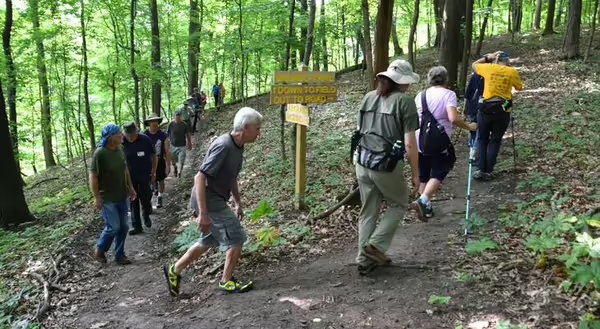
There are a few simple steps to prevent the spread of invasive species.
Avoid moving soil or debris from one area to another.
When engaging in fishing, hiking, hunting, or camping activities, ensure that your clothes, footwear, and equipment are free of soil and debris before entering natural areas. Use boot cleaning stations where available and inform others about ways to prevent the spread of invasive species. Chief Seattle said it well, "Take nothing but memories, leave nothing but footprints!"
Trails/Trailheads
Before starting on a trail, check your clothes, footwear, and pets for soil and debris containing seeds, tiny insect eggs, microscopic fungal spores, or other reproductive material from invasive species. Let others you meet know how to help prevent invasive species from spreading. Play, clean, go is a campaign to encourage use of boot brush stations and following guidelines to reduce the spread of invasive species.
Lakes, Rivers, and Streams
Before entering the water or crossing a stream about 200 feet from the water, be sure your clothes, footwear, and equipment are free of soil and debris, which may conceal seeds and other materials.
When fishing, dispose of bait in approved locations (not into the water or on the shoreline) to prevent the accidental introduction of invasive organisms into water bodies. Before entering the water, ensure that your clothes, footwear, and equipment are free of soil and debris. Clean your clothes, footwear, and equipment of any mud or debris before moving to a new area. A brush and water from the river or stream make cleaning quick and easy. Take a few extra moments to protect Illinois' wild places!
Campsites
Always buy or use local firewood for campfires. Leave unused wood at the campsite. Before leaving home, ensure that your vehicle, tent, and other camping equipment are clean and free of soil and other debris containing seeds, insect eggs, or fungal spores. Remove soil and debris from your vehicle, tent, and other equipment when packing to go home. Dispose of waste in approved containers or bags and dispose of it at home. Watch out for invasive insects or their larvae trying to hitch a ride on your vehicle, camper, or gear.
Boating/Fishing/Swimming Access Points
Follow the Clean, Drain, Dry recommendations and any posted requirements when launching or removing a boat or other equipment from the water. Inspect, clean, drain, and then dry your boats and equipment after using them to prevent the introduction of organisms into or transport from one body of water to another.
Nature Viewing Areas
Help protect these areas by keeping clothing, footwear, gear, and pets free of soil and other natural debris. Also, debris from equipment such as bikes, blankets, tarps, strollers, or wheelchairs should be removed. The high numbers of visitors to these areas make them especially vulnerable to invasion.
Historical Sites
Preserve the past by examining, but not touching, cultural or historic structures and artifacts. Keep clothing, footwear, and pets free of soil and other natural debris. Remove debris from vehicles and equipment such as bikes, strollers, or wheelchairs. Be sure to leave plants, rocks, and other natural objects where you find them.
Pets
Ensure that pets are clean and free of soil and debris before beginning your visit. Brush them when moving from one trail or camping area to another. Check them for seeds and other debris after walking them and before putting them back into your vehicle. Control pets at all times for their safety and the safety of campers and wildlife.
By following these simple steps and sharing them with others, you can become a champion for our natural spaces and help prevent the spread of invasive species. Together, we can protect the biodiversity and beauty of Illinois for generations to come. Learn more about invasive species at University of Illinois Extension Invasives.